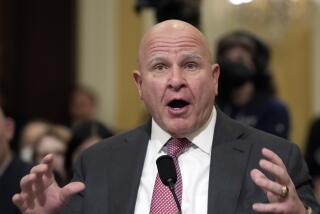The cold war inside the Pentagon
BOB WOODWARD’S new book, “State of Denial,” has political junkies everywhere chattering. Along with its gossipy insider revelations, the book casts light on at least one important substantive issue: the abysmal state of relations between the nation’s top generals and the Pentagon’s senior civilian leaders, most notably Secretary of Defense Donald H. Rumsfeld.
The debacle that is Iraq today has many sources. Among them, civil-military dysfunction may well deserve pride of place. At the pinnacle of the U.S. national security establishment, mistrust and mutual manipulation rather than candor and mutual respect form the basis of interaction between civilian and military chiefs.
This has been true for decades, although the generals and the politicians have pretended otherwise. Now Woodward has let the cat out of the bag.
An anecdote from “State of Denial” makes the essential point. Marine Corps Gen. James Jones was asking fellow Marine Gen. Peter Pace, at the time the leading candidate to become chairman of the Joint Chiefs of Staff, if he really wanted a job that had become so emptied of authority. “You should not be the parrot on the secretary’s shoulder,” Jones reportedly said.
Jones accurately described the role of generals like Pace (now perched compliantly above Rumsfeld’s lapels) and the other Joint Chiefs. In determining the conduct of the Bush administration’s global war on terror, the civilians in the office of the secretary of Defense call the shots. Apart from being trotted out on ceremonial occasions, the Joint Chiefs have become all but invisible. Certainly, on questions related to basic national security policy, they have become irrelevant.
Some of this qualifies as payback. During the 1990s, in the aftermath of Operation Desert Storm, the Joint Chiefs were riding high and used their clout to show their civilian “masters” who was really boss. During the largely contrived controversy over gays in the military, the Joint Chiefs publicly humiliated the newly elected president, Bill Clinton.
When the Army botched the raid leading to the famous Mogadishu firefight of 1993, leaks coming from within the armed services quickly foisted blame on Secretary of Defense Les Aspin. No generals lost their jobs over Mogadishu, but Aspin lost his. Throughout the Clinton era, the Joint Chiefs continued to exercise a quasi-veto over matters related to national security.
When Rumsfeld took office in 2001, he was intent on shoring up the principle of civilian control. He has done that -- although Rumsfeld’s idea of control amounts to emasculation. He has bludgeoned generals into submission, marginalized or gotten rid of those inclined to be obstreperous and selected pliable replacements such as Pace.
Assuming -- not without reason -- that professional military advice frequently comes tainted with extraneous considerations, he has treated that advice with disdain. Flawed decisions have resulted, adversely affecting everything from war planning to dealing with the Iraq insurgency. Perhaps worse still, Rumsfeld’s de facto silencing of the most senior generals has induced a strategic paralysis. Because the secretary of Defense is not inclined to entertain fundamental questions about Iraq, no one else dares even to pose such questions.
Again, Woodward lifts the veil, recounting the concerns of former White House Chief of Staff Andrew Card that the administration might not be exploring the full range of alternatives for dealing with the war. “Card put it on the generals in the Pentagon and Iraq,” Woodward wrote. “If they had come forward and said to the president, ‘It’s not worth it’ or ‘The mission can’t be accomplished,’ ” options other than simply staying the course might have gained a hearing. But Rumsfeld’s generals know better than to venture such opinions.
The issues on which military success or failure in Iraq will turn fall squarely within the realm of military expertise. These matters -- related to the size, the proper employment and the sustainability of U.S. forces -- lie largely beyond the competence of civilians such as the secretary of Defense.
The restoration of an effective civil-military compact -- one based on honesty and forthrightness rather than dissimulation -- promises to be a daunting task, the equivalent of restoring trust to a marriage after both parties have committed serial infidelities. No doubt Rumsfeld’s removal from office stands as a necessary first step. But we should not kid ourselves into thinking that his departure alone will suffice.
A state of denial nicely describes the Bush administration’s attitude about Iraq. But “state of denial” also describes our attitude toward a long festering civil-military discord. As long as that discord persists, the likelihood of more Iraqs will loom large.
More to Read
Sign up for our Book Club newsletter
Get the latest news, events and more from the Los Angeles Times Book Club, and help us get L.A. reading and talking.
You may occasionally receive promotional content from the Los Angeles Times.






